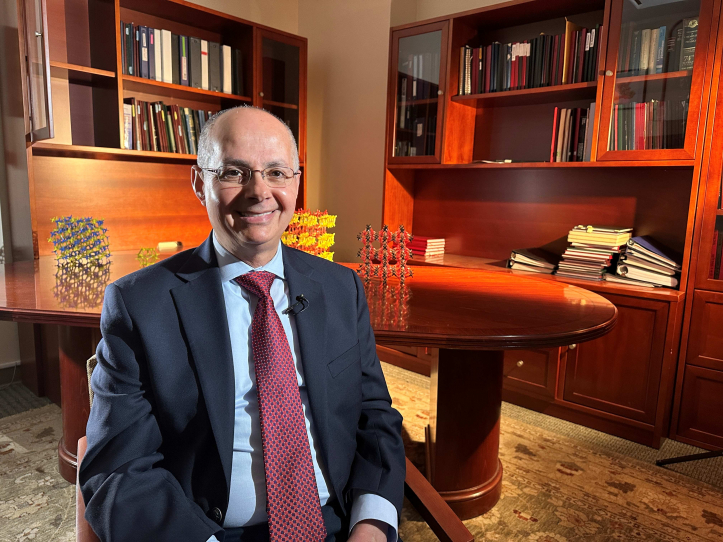Tang Prize in Sustainable Development 2024 is awarded to Prof. Omar M. Yaghi, for extraordinary contributions to sustainable development with his pioneering Metal-Organic and other ultra porous Frameworks that can be tailored for carbon capture, hydrogen and methane storage, as well as water harvesting from desert air
Prof. Omar M. Yaghi is currently the James and Neeltje Tretter Chair Professor of Chemistry, Department of Chemistry, University of California, Berkeley, and a Senior Faculty Scientist at Lawrence Berkeley National Laboratory. He is also the Founding Director of the Berkeley Global Science Institute and Co-Director of both the Kavli Energy Nano Sciences Institute and the California Research Alliance by BASF. Prior to his arrival at UC-Berkeley in 2012, Prof. Yaghi had taught at Arizona State Uni., Univ. of Michigan, and UCLA between 1992-2011.
Prof. Yaghi has demonstrated a new way to control four of the smallest gas molecules in the atmosphere that have the biggest impact on the sustainable development of our planet - carbon dioxide, hydrogen, methane, and water. This is made possible by his pioneering development of a new field of Chemistry, Reticular Chemistry. It is a new way to make materials by stitching organic and inorganic units into robust, porous crystalline metal-organic frameworks (MOFs) and covalent organic frameworks (COFs) through strong bonds. He demonstrated how hydrogen, methane, carbon dioxide and water from air can be trapped, concentrated, and manipulated by these two extensive classes of novel framework materials, thus opening up new solutions to current challenges to our planet, namely, clean air, clean energy, and clean water.
The key to Prof. Yaghi’s success has been the synthetic approach to MOFs and COFs which has created unique materials that display such versatile properties. Specifically, these materials are known to possess record-breaking porosities, robust yet flexible crystallinity, scalability to multi-ton quantities, and the chemical flexibility with which their structures can be modified on the molecular level. For Hydrogen, MOF and COF materials can store twelve weight percent of hydrogen in a tank filled with MOFs (77 K, 100 bar)—making this technology useful for the safe and stationary storage of hydrogen. For Methane, a fuel tank filled with MOFs can triple the amount of methane stored at room temperature and safe pressures compared to a tank without MOFs under the same conditions. This has made it possible for automobiles to triple the distance traveled without refueling. For Carbon Dioxide, Prof. Yaghi showed that at room temperature carbon dioxide storage capability could be increased 18 folds simply by adding one of his MOFs. And chemically modified MOFs and COFs are capable of selectively capturing carbon dioxide from combustion gases in voluminous amounts.
For Water, Prof. Yaghi discovered that MOFs seek and trap water from low humidity air and concentrate it within their pores. Using the reticular approach, he designed a water harvester, the first of its kind, to deliver fresh drinking water in desert and arid regions with no energy input other than the ambient sunlight. Subsequently his research group designed several generations of prototypes employing kilograms of MOFs and showed that these water harvesters work well in some of the driest deserts in the world. Remarkably, his MOFs water harvesters have been found to maintain their optimal performance after testing for over thirty thousand cycles. The water harvested has been shown to be ultra-pure exceeding U.S. FDA and EPA standards for drinking water. More recently, Prof. Yaghi teamed up with industrial companies including General Electric to build portable MOFs water harvesters capable of delivering hundreds of liters per day in an energy-efficient and economical manner.
Prof. Yaghi’s contributions are unique since he has succeeded in taking his ground-breaking basic science to unprecedented levels of practical applications for sustainability. The applications of his technologies for clean energy, clean air, and ultra-pure water are now being pursued by hundreds of laboratories in academia and industry worldwide. Commercialization of these technologies are already underway with products being made by thirty new start-up companies and by most major chemical, materials, and automobile companies. Over 100,000 MOFs and COFs have been made to date as a result of Prof. Yaghi’s Reticular Chemistry. The global impact of Yaghi ‘s technology was a subject of MarketWatch in 2021 when it estimated that the MOFs and COFs market was US$ 271 Million. It reached US$ 351 Million in 2022. For his work, Prof. Yaghi holds 60 US patents and has been honored with many prestigious awards from 17 countries, some of which are among the highest in Chemistry.
Prof. Yaghi was born in Amman, Jordan to a refugee family, originally from Palestine. He grew up in the desert environment and understood very well the power of science and research in transforming lives in regions where opportunities are scarce. The widespread use of MOFs and COFs worldwide has provided Prof. Yaghi an avenue to engage emerging scholars from developing countries in research. He founded the Berkeley Global Science Institute at the University of California and has developed unique mentoring programs, which are being implemented in centers of research he built in countries such as Vietnam, Malaysia, Saudi Arabia, Argentina, Mexico, and Jordan. These centers aim to invite the youth to ‘plug’ into research locally at an early age and begin the process of transforming themselves and contributing to their scientific environment in a meaningful manner. Thus far, hundreds of researchers have benefited from the ‘global science’ model Prof. Yaghi created.
It is extremely rare that people in their profession have created a new field, and at the same time given others the confidence that they can enter the area. This, Prof. Yaghi has done. He has pioneered the development of a completely new class of highly important materials, and he has developed the concept of Reticular Chemistry to generalize the synthesis of such new materials. Those materials in turn have created new avenues and are at the forefront of solving the world’s most pressing challenges of energy, environment and, in particular water sustainability.









